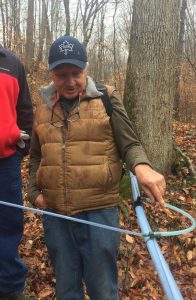By Karen Milnes

Mike Rechlin, professor at Future Generations University, gives a tubing demonstration.
Everybody knows about Vermont maple syrup, and it’s time to put West Virginia on the map. With an estimated 0.04% (USDA—NASS) of the state’s tappable maples in production, there’s a lot of room for growth. And if this industry is doing anything, it is growing. And fast. According to a survey conducted by the Appalachian program at Future Generations, the number one component in helping our state’s maple industry expand is the need for more sap from more taps.
With ongoing innovations in the sap to syrup process, a growing number of West Virginia producers are capable of processing a lot more sap than they can obtain. Backyard syrup making is not only a mountain tradition in these parts, it’s a growing hobby as the farm and food movement sweeps across our nation. The Sweet Opportunites: Tapping West Virginia’s Maple Resource project at Future Generations University aims to start networking sap collectors and syrup producers, setting up a “hub” model, already popular in more established maple syrup producing states. What’s nice about this model is that it allows, for fairly minimal overhead, just about any landowner with maples on their property and a maple syrup producer nearby, to break into the industry with little risk. Oftentimes, sap collectors simply selling their raw sap are able to pay off the collection equipment in the first year. In a relatively short time, they can begin scaling up their operations and considering purchasing larger equipment to begin producing their own syrup.
